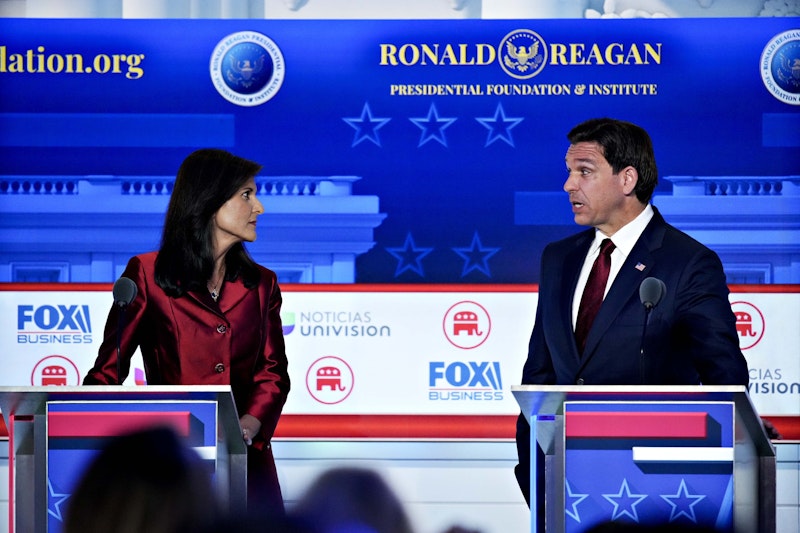If Donald Trump wins in November and is president for two non-consecutive terms, that will be something the populist Republican has in common with the last Democratic president who was friendly to the idea of limiting government, Grover Cleveland. Cleveland governed for two terms at the end of the 19th century—opposing, among other forms of government overreach, the U.S.’s imperialist annexation of Hawaii.
Perhaps Trump, who whipsaws between wanting to limit government and simply wanting to limit his enemies, should start calling himself a “new Cleveland” and see if that helps him pick up votes in Hawaii (not to mention Ohio). This would be no stranger than a libertarian-leaning New York City Council candidate I met several years ago trying to gain some free-market votes and restore the Democrats’ lost tradition of classical liberalism at the same time by calling himself a “Grover Cleveland Democrat.”
Electoral politics, always philosophically incoherent, is largely about cobbling together temporary coalitions, after all—especially if those coalitions can be made to look natural and timeless. On the right, Reagan was the real winner in this regard, making it look as if the three legs of the conservative stool—markets, moral traditionalism, and the military—fit together as neatly and logically as any tidy libertarian argument and picking up various constituencies’ much-needed votes in the process. (To a conventional leftist, that coalition looks like a Cerberus of major evils, of course: corporations, Christianity, and conquest.)
So the question in the Republican caucus/primary process becomes not just which candidates make the best arguments but which ones can plausibly stitch together the different parts of the Republican coalition. The parts have been very roughly the same for about 70 years now, but the rationale for yoking them together changes slightly with the times and the presidential nominee.
On paper (especially a whitepaper from a staid thinktank), Nikki Haley looks like a safe, Reaganesque bet for 2024, praising capitalism, defense spending, and conventional-enough morals to fend off, say, the excesses of the trans movement—all while threading a tricky needle by being both pro-immigration (herself the daughter of immigrants) and sufficiently averse to discussing racial issues that the South Carolina constituents who made her a governor won’t be offended by too much talk about the Civil War. We could do worse.
But Sen. Rand Paul, who I’d hoped back in early-2016, before Trump’s triumph, might be the new glue in the coalition—extremely libertarian on economics and constitutional issues, Christian enough to please the moralists without being theocratic, accepting of defense spending without being an enthusiast of military intervention, and to cap it all off both smart and populist-sounding slightly before populism had become an obvious GOP prerequisite—has sounded the likely death-knell of the idea of Haley as unifier, very publicly announcing that he may not know who he’s endorsing for president just yet but knows he (and each other signer of a current online petition) is “Never Nikki” for purposes of primary voting, largely because of her militarism.
But the conventional coalition-building wisdom at this point would be that no matter how well Haley fared in Iowa, and even if she wins New Hampshire, Trump’s so popular and unstoppable in the months ahead that at most Haley should be prepping for the vice president slot on the ticket instead of the top anyway (or if Trump unexpectedly vanishes due to legal troubles, perhaps Haley on top with DeSantis as v.p., as poor Ramaswamy worries).
Even Rand Paul might grudgingly find a Trump-Haley ticket acceptable. If Republicans overwhelmingly think a populist as bizarre and as indifferent to conventional conservative prerequisites as Trump is acceptable at the top of the ticket, surely a Reaganite like Haley in the second spot can’t be a deal-breaker. She’s juggling in exactly the way that maximized acceptability for the Republicans when they were riding high in the 1980s, so maybe cut her some slack.
Then again, Trump makes his own quirky decisions, and a different way of cementing parts of the coalition, after Trump’s eventual near-certain securing of the nomination, might be to make Rand Paul himself Trump’s running mate.
The establishment left hates Paul to an irrational degree—despite his advocacy of drug legalization, criminal justice reform, anti-imperialism, and privacy protections. Think how many error-filled articles denouncing libertarianism in general and Paul in particular ran on arrogant establishment-left sites such as Slate, Salon, RawStory, and AlterNet back around 2013, roughly weekly, when the left naively thought Paul becoming the next Republican presidential nominee was the most upsetting and threatening thing they could imagine (ha!).
Most people, though, even ones who disagree with him, likely see in Paul a conviction-driven politician who would stick to his plainly-stated views and to the principles of the Constitution—while to the surprise of many Ron DeSantis looks more and more like a floundering product of focus group results and half-hearted, off-key strategies. He’s trying to tie the coalitional parts together, but we can see him trying, sometimes much too strenuously, and it’s becoming sad and off-putting.
Trump, by contrast, for all his deranged and dangerous deviations, makes it all seem sort of effortless, like Frank Sinatra missing various notes in a Vegas show but usually looking very relaxed and natural while doing it—except when having people who cross him roughed up.
—Todd Seavey is the author of Libertarianism for Beginners and is on X at @ToddSeavey

